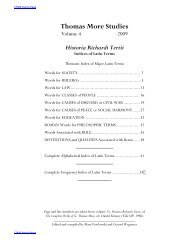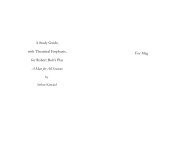life of john picus earl of mirandola - The Center for Thomas More ...
life of john picus earl of mirandola - The Center for Thomas More ...
life of john picus earl of mirandola - The Center for Thomas More ...
You also want an ePaper? Increase the reach of your titles
YUMPU automatically turns print PDFs into web optimized ePapers that Google loves.
<strong>The</strong> flesh voluntarily<br />
afflicted <strong>for</strong> God’s sake<br />
[65]<br />
Anger or wrath can<br />
have no place in a<br />
godly mind.<br />
No misadventure<br />
could happen to J.<br />
Picus so grievous as<br />
the loss <strong>of</strong> his books.<br />
16 <strong>Thomas</strong> <strong>More</strong>’s Life <strong>of</strong> John Picus<br />
that he might the more easily by him as by a faithful messenger relieve<br />
the necessity and misery <strong>of</strong> poor needy people such as himself haply<br />
could not come by the knowledge <strong>of</strong>.<br />
⌐ Of the Voluntary Affliction and Paining <strong>of</strong> his own Body. ¬ Over all this,<br />
many times (which is not to be kept secret) he gave alms <strong>of</strong> his own<br />
body. We know many men which (as Saint Jerome saith) 1 put <strong>for</strong>th<br />
their hand to poor folk, but with the pleasure <strong>of</strong> the flesh they be<br />
overcome; but he many days (and namely those days which represent<br />
unto us the passion and death that Christ suffered <strong>for</strong> our sake) beat<br />
and scourged his own flesh in the remembrance <strong>of</strong> that great benefit<br />
and <strong>for</strong> cleansing <strong>of</strong> his old <strong>of</strong>fences.¦<br />
⌐ Of his Placability or Benign Nature. ¬ He was <strong>of</strong> cheer always merry<br />
and <strong>of</strong> so benign nature that he was never troubled with anger,¦ and<br />
he said once to his nephew 2 that whatsoever should happen (fell<br />
there never so great misadventure) he could never, as him thought,<br />
be moved to wrath, but if° his chests perished in which his books lay<br />
that he had with great travail and watch compiled. But <strong>for</strong>asmuch as<br />
he considered that he laboured only <strong>for</strong> the love <strong>of</strong> God and pr<strong>of</strong>it<br />
<strong>of</strong> His Church, and that he had dedicated unto Him all his works, his<br />
studies and his doings, and since he saw that, ⌐ since God is almighty, ¬<br />
they could not miscarry but if it were either by His commandment or<br />
by His suffereance, he verily trusted, ⌐ since God is all good, ¬ that He<br />
would not suffer him to have that occasion <strong>of</strong> heaviness.° 3 O ⌐ very ¬<br />
happy mind, which none adversity might oppress, which no prosperity<br />
might enhance¦; not the cunning <strong>of</strong> all philosophy was able to make<br />
him proud, not the knowledge <strong>of</strong> the Hebrew, Chaldee° and Arabic<br />
language, besides Greek and Latin, could make him vainglorious; not<br />
his great substance, not his noble blood could blow up his heart, not the<br />
beauty <strong>of</strong> his body, not the great occasion 4 <strong>of</strong> sin, were able to pull him<br />
16 but if unless / 23 heaviness sorrow / 26 Chaldee Aramaic, not Chaldean (see CW 1:219)<br />
¦ 11 <strong>More</strong> omits Gianfrancesco’s brief first person testimony regarding Picus’ voluntary afflictions<br />
: “and with my own eyes—may all redound to the glory <strong>of</strong> God!—I have <strong>of</strong>ten seen the<br />
whip” (CW 1:323). / 13 <strong>More</strong> omits multis etiam audientibus testatus sit, “that he testified, in the<br />
hearing <strong>of</strong> many persons” (CW 1:322, 323). / 25 <strong>More</strong> omits ut palam fiet, “as will become<br />
clear” (CW 1:322, 323).<br />
1. Rigg cites Saint Jerome’s Epistola ad Eustochium Virginem (84, n. 13) as the source.<br />
2. he said once to his nephew: <strong>More</strong> alters Gianfrancesco’s first person account—Recolo mihi inter<br />
loquendum dixisse (CW 1:322).<br />
3. He…heaviness: A noteworthy departure from the Latin—confidebat se non contristatum iri, “he<br />
[Picus] trusted he would not be saddened by it” (CW 1:322, 323).<br />
4. occasion: Latin licentia (CW 1:322).<br />
5<br />
10<br />
15<br />
20<br />
25











